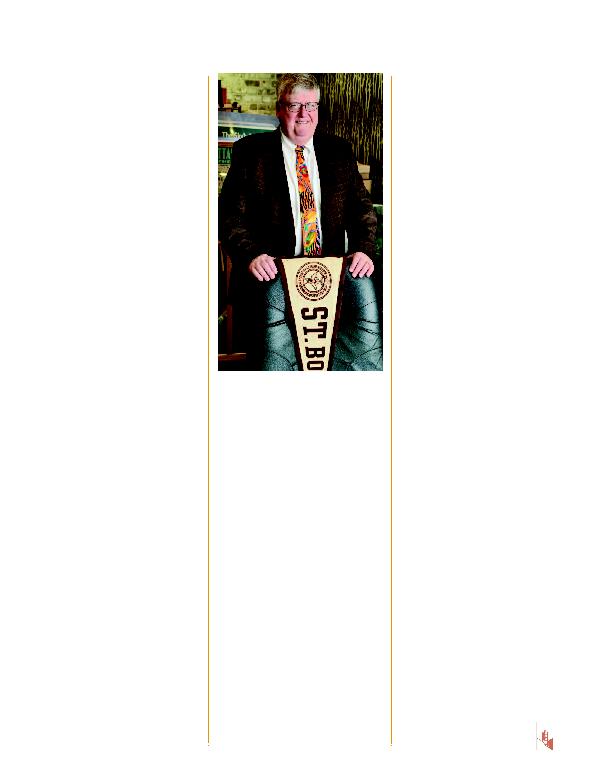
more than five seconds without feeling
it," he said. "You may not be able to
articulate it, but you have that feeling."
ter of the late Dr. Kenneth Anderson, a
longtime St. Bonaventure biology profes-
sor who also served as dean of Arts and
Sciences and Graduate Studies. Joan is
one of 11 children, 10 of whom have St.
Bonaventure degrees.
Their daughter, Colleen C. Young, is the
bank's chief financial officer. Colleen and
her three brothers, the aforementioned
Thomas, Joseph and Timothy (all three
sons live and work in Chicago), are also
Bonaventure graduates.
he is today.
the work ethic, the desire to do the right
thing and to help others."
Western New York anyway.
We might be in the minority because
we don't have any other branches, but
there are other independent banks that
really focus on the community instead
of the big corporate clients," she said.
you're supposed to do help people."
associate professor of finance and
founder and coordinator of
BonaResponds, the university's student-
driven volunteer disaster-relief organiza-
tion.
philanthropist, and I think that's really
what we teach here," said Mahar. "If
you look at our track record across the
board, whether it's giving back to the
university, starting charities, or working
with the poor and using your business
know-how to help them, I think we do a
really good job at it."
at the Bank of Cattaraugus reinforces
the school's message.
our students that instilling these values
into a business is not a pipe dream, that
it can be done. Pat Cullen and his family
have shown you can make that hap-
pen," said Palmer.
retired, I just don't understand what
they don't do," he said with a smile.
"There are so many people to help out
there."
his family for three generations.
didn't know better, you'd swear
his cluttered office in the back
workshop. He delights in pulling arti-
facts out of hiding and regaling visitors
with tales of what Cattaraugus once
was. Abraham Lincoln visited
Cattaraugus. So did Daniel Webster,
Commodore Matthew Perry, and Mark
Twain, who even named a cat in one of
his stories "Cattaraugus."
crowded around a railroad car stopped
at the Main Street crossing. On the car's
rear platform, waving to the locals, is
Teddy Roosevelt. It was his last speech
before being elected governor of New
York.
business determined not only to pre-
serve the past, but to use it to create a
prosperous future. The corporation has
purchased and renovated several old
buildings in town and recently acquired
the very plot of land where Teddy
Roosevelt's campaign train stopped
more than 100 years ago.
according to plans, the first building
could go up next year. An admitted
packrat, Cullen said he has "buildings
full of neat things."
revitalize the town," said son Thomas.
"It's as important in his life as anything
else."
"They're a real `Main Street Bank'
live on their own Main Street," he said.
exposure, and why, as a Bona grad, part
of him can't help wondering what all
the fuss is about.
ence, but also that nobody is more
important than the next person," he
said.
Bonaventure.)
N
2
2